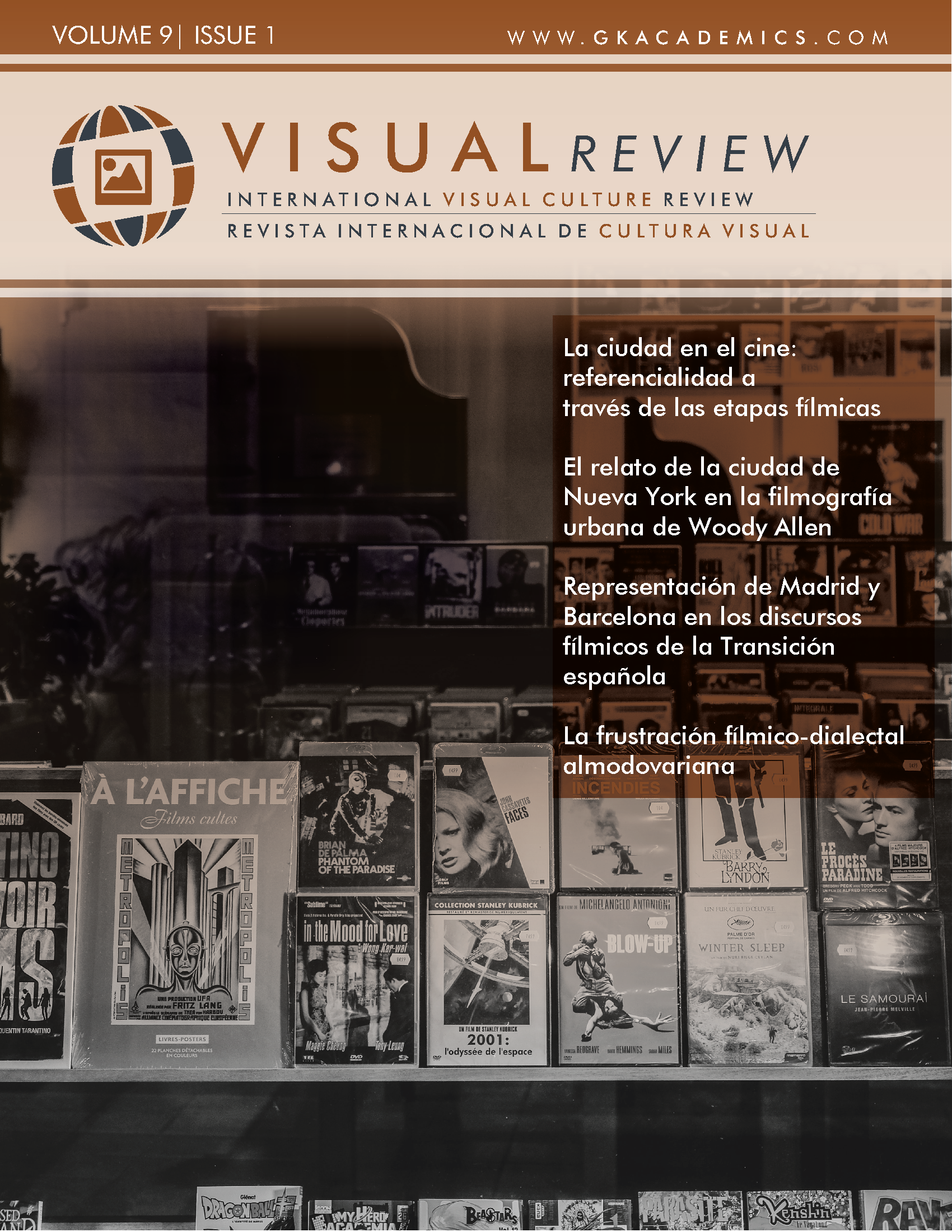Filmic-dialectal frustration in the world of Almodóvar
Approaches and Analysis of the Subversive Untranslatability in Two 1980s' Feature Films by Pedro Almodóvar
DOI:
https://doi.org/10.37467/gkarevvisual.v9.3068Keywords:
Pedro Almodóvar, Movida Madrileña, subtitles, untranslatable, 1980sAbstract
In the context of the last quarter of the 20th century in Spain, cinema played an important role in the subversive process of a society that was awakening from its dictatorial lethargy to cope with European cultural modernity. We can find evidence of this process in the first feature films by the Spanish director Pedro Almodóvar. They capture a transgressive contemporary imaginary, both visual and lexical, that the French-language subtitles dilute and even make disappear, generating a subversive frustration resulting from the untranslatability of the original audio-visual component.
Downloads
Global Statistics ℹ️
|
565
Views
|
260
Downloads
|
|
825
Total
|
|
References
Alarcos Llorach, E. (1994). Gramática de la Lengua Española. Ediciones Espasa.
Álvarez Osés, J. A., Cal Freire, I., Haro Sabater, J. Y González Muñoz, M. C. (2000). La guerra que aprendieron los españoles. República y Guerra Civil en los libros de Bachillerato (1938-1983). Los libros de la catarata.
Berzosa Camacho, A. (2012). La sexualidad como arma política. Cine homosexual subversivo en España en los años setenta y ochenta. [Tesis de doctorado]. Universidad Autónoma de Madrid. https://dialnet.unirioja.es/servlet/tesis?codigo=25349.
Bourdieu, P. (2000). La dominación masculina (La domination masculine, 1998). Anagrama.
Butler, J. (2007). El género en disputa (Gender Trouble, 1990). Paidós.
Gubern, R. (2014). Movida y transgresión en el primer Almodóvar. En P. Poyato Sánchez (Ed.), El cine de Almodóvar. Una poética de los “trans” (pp. 15-27). Universidad Internacional de Andalucía.
De Hoyos González, M. (1981). Una variedad en el habla coloquial: la jerga ‘cheli’. Cauce. Revista Internacional de Filología, Comunicación y sus Didácticas, 4, 31-39.
Folguera Crespo, P. (1997). El franquismo. El retorno a la esfera privada (1939-1975). En E. Garrido (Ed.), Historia de las mujeres en España (pp. 527-549). Síntesis.
Khameneh Bagheri, T. (2009). Étude sur la formation du verlan dans la langue française. Pazhuhesh-e Zabanha-ya Khareji, 53, 5-21. Special Issue, French. Recuperado el 20 de septiembre de 2019 de https://jor.ut.ac.ir/article_19594_22d14d9068b16fa4c6a2ae75551fbaa0.pdf
Lavaur, J-M., & Nava, S. (2008). Interférences liées au sous-titrage intralangue sur le traitement des images d’une séquence filmée. Actas del coloquio del Congreso 2007 de la Société Française de Psychologie. Nantes. Recuperado el 20 de septiembre de 2019 de https://www.researchgate.net/publication/233408022_Interferences_liees_au_sous-titrage_intralangue_sur_le_traitement_des_images_d%27une_sequence_filmee.
Martín Garzo, G. (2014). Cuatro películas, El cine de Almodóvar. En P. Poyato Sánchez (Ed.), El cine de Almodóvar. Una poética de los “trans” (pp. 81-96). Universidad Internacional de Andalucía.
Podhorná-Polická, A. (2006). Les aspects stylistiques de la verlanisation. Recuperado el 20 de septiembre de 2019 de https://www.muni.cz/en/research/publications/727509.
Porras Ferreyra, J. (2008, julio-diciembre). El séptimo arte y el estudio de las transiciones a la democracia: el cine español de la transición. Revista Politeia, 41(31), 139-163. Instituto de Estudios Políticos, Universidad Central de Venezuela. Recuperado el 07 de septiembre de 2020 de http://www.redalyc.org/articulo.oa?id=170018434005.
Poyato Sánchez, P. (2014). La escritura del “almodrama”. En P. Poyato Sánchez (Ed.), El cine de Almodóvar. Una poética de los “trans” (pp. 99-124). Universidad Internacional de Andalucía.
Prego, V. (1996). Así se hizo la Transición. Plaza & Janés.
Robert, P, Rey, A, & Rey-Debove, J. (1993). Le Petit Robert. Dictionnaires Le Robert.
Salinas, J. (2006, 10 de septiembre). Cine: versión, diversión y subversión. Revista Digital Universitaria. 7 (9). Recuperado el 07 de septiembre, 2020 de http://www.revista.unam.mx/vol.7/num9/art76/int76.htm.
Sánchez Noriega, J. L. (2017). Universo Almodóvar. Estética de la pasión de un cineasta posmoderno. Alianza Editorial. DOI: https://doi.org/10.12795/AdMIRA.2017.02.07
Scott, J. C. (2000). Los dominados y el arte de la resistencia. Ediciones Era.
Seguin, J. C. (2014). Madrid y Pedro Almodóvar. En P. Poyato Sánchez (Ed.), El cine de Almodóvar. Una poética de los “trans” (pp. 29-51). Universidad Internacional de Andalucía.
Seguin, J. C. (1989). Pedro Almodóvar : l’art d’accommoder les restes. En Nos Années 80 (7-14). Hispanística XX, Culture Hispanique, numéro 7, Centre d’Études et de Recherches hispaniques du XXe siècle, Université de Bourgogne.
Tyler, P. (1973). Cine Underground. Historia crítica (Underground Film: A Critical History, 1969). Planeta.
Umbral, F. (1983). Diccionario Cheli. Narrativa 80.
Vidal, N. (1988). El cine de Pedro ALMODÓVAR. Instituto de la Cinematografía y las Artes Audiovisuales, Ministerio de Cultura.
Webografía
Diccionario panhispánico del español jurídico. (s.f.). Grito subversivo. Diccionario panhispánico del español jurídico. https://dpej.rae.es/lema/grito-subversivo
Real Academia Española. (s.f.). Subversivo. Diccionario de la lengua española, 23.ª ed., [versión 23.4 en línea]. https://dle.rae.es/subversivo
Real Academia Española. (s.f.). Subvertir. Diccionario de la lengua española, 23.ª ed., [versión 23.4 en línea]. https://dle.rae.es/subvertir.
Real Academia Española. (s.f.). Transgedir. Diccionario panhispánico del español jurídico (DPEJ) [en línea]. https://dpej.rae.es/buscador-general/transgredir.
Muñoz Cáliz, B. La desaparición de la censura. Recuperado el 07 de septiembre de 2020 de http://www.bertamuñoz.es/censura/cap5_1.html.
Downloads
Published
How to Cite
Issue
Section
License
Those authors who publish in this journal accept the following terms:
-
Authors retain copyright.
-
Authors transfer to the journal the right of first publication. The journal also owns the publishing rights.
-
All published contents are governed by an Attribution-NoDerivatives 4.0 International License.
Access the informative version and legal text of the license. By virtue of this, third parties are allowed to use what is published as long as they mention the authorship of the work and the first publication in this journal. If you transform the material, you may not distribute the modified work. -
Authors may make other independent and additional contractual arrangements for non-exclusive distribution of the version of the article published in this journal (e.g., inclusion in an institutional repository or publication in a book) as long as they clearly indicate that the work was first published in this journal.
- Authors are allowed and recommended to publish their work on the Internet (for example on institutional and personal websites), following the publication of, and referencing the journal, as this could lead to constructive exchanges and a more extensive and quick circulation of published works (see The Effect of Open Access).













